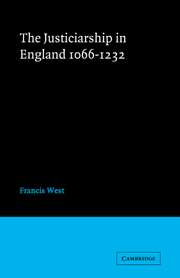Book contents
- Frontmatter
- Contents
- List of Abbreviations
- Introduction
- I THE ORIGINS OF THE JUSTICIARSHIP
- II THE JUSTICIARSHIP UNDER HENRY II
- III THE JUSTICIARSHIP UNDER RICHARD I
- IV THE JUSTICIARSHIP UNDER JOHN: BEFORE THE LOSS OF NORMANDY
- V THE JUSTICIARSHIP UNDER JOHN: AFTER THE LOSS OF NORMANDY
- VI THE JUSTICIARSHIP IN JOHN'S LAST YEARS
- VII THE JUSTICIARSHIP UNDER HENRY III
- Bibliography
- Index
- Frontmatter
- Contents
- List of Abbreviations
- Introduction
- I THE ORIGINS OF THE JUSTICIARSHIP
- II THE JUSTICIARSHIP UNDER HENRY II
- III THE JUSTICIARSHIP UNDER RICHARD I
- IV THE JUSTICIARSHIP UNDER JOHN: BEFORE THE LOSS OF NORMANDY
- V THE JUSTICIARSHIP UNDER JOHN: AFTER THE LOSS OF NORMANDY
- VI THE JUSTICIARSHIP IN JOHN'S LAST YEARS
- VII THE JUSTICIARSHIP UNDER HENRY III
- Bibliography
- Index
Summary
Unlike the sheriff and the chancellor, the justiciar has had no historian, although his person, his office, and his duties have inevitably figured in many mediaeval administrative studies. The chief reason for the lack of any major work dealing with the justiciarship is undoubtedly the width and scope of the office. Because he was the king's alter ego, any study of his office is of almost the same magnitude as a history of the kingship itself. As soldier and politician, feudal magnate or great bishop, judge and financier, the justiciar had so many and varied aspects that to draw them within the covers of one book is a formidable and difficult task, but it is one of decided value and usefulness, because a study of the justiciarship is an examination of the centre of power in Angevin England, of the heart of English mediaeval government.
The breadth and complications of the justiciarship lead one to an approach which is suggested on other grounds. It is almost a cliché to say that the man was always more important than the office in the early Middle Ages, and that therefore the importance of an office varied with closeness of its holder's relations with the king and perhaps with his feudal significance. This alone would prompt an examination of the justiciarship through its individual tenants, but when the complexity of its duties is so great unity of theme is to be found only in the men who carried them out.
- Type
- Chapter
- Information
- Justiceship England 1066–1232 , pp. ix - xiiPublisher: Cambridge University PressPrint publication year: 1966



